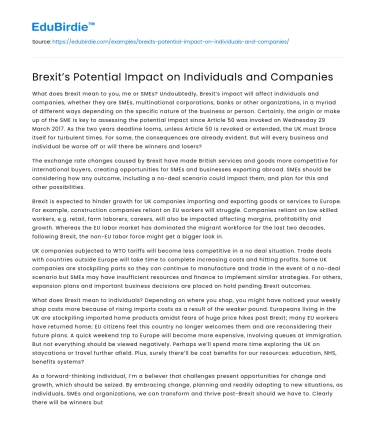What does Brexit mean to you, me or SMEs? Undoubtedly, Brexit’s impact will affect individuals and companies, whether they are SMEs, multinational corporations, banks or other organizations, in a myriad of different ways depending on the specific nature of the business or person. Certainly, the origin or make up of the SME is key to assessing the potential impact since Article 50 was invoked on Wednesday 29 March 2017. As the two years deadline looms, unless Article 50 is revoked or extended, the UK must brace itself for turbulent times. For some, the consequences are already evident. But will every business and individual be worse off or will there be winners and losers?
The exchange rate changes caused by Brexit have made British services and goods more competitive for international buyers, creating opportunities for SMEs and businesses exporting abroad. SMEs should be considering how any outcome, including a no-deal scenario could impact them, and plan for this and other possibilities.
Save your time!
We can take care of your essay
- Proper editing and formatting
- Free revision, title page, and bibliography
- Flexible prices and money-back guarantee
Brexit is expected to hinder growth for UK companies importing and exporting goods or services to Europe. For example, construction companies reliant on EU workers will struggle. Companies reliant on low skilled workers, e.g. retail, farm laborers, careers, will also be impacted affecting margins, profitability and growth. Whereas the EU labor market has dominated the migrant workforce for the last two decades, following Brexit, the non-EU labor force might get a bigger look in.
UK companies subjected to WTO tariffs will become less competitive in a no deal situation. Trade deals with countries outside Europe will take time to complete increasing costs and hitting profits. Some UK companies are stockpiling parts so they can continue to manufacture and trade in the event of a no-deal scenario but SMEs may have insufficient resources and finance to implement similar strategies. For others, expansion plans and important business decisions are placed on hold pending Brexit outcomes.
What does Brexit mean to individuals? Depending on where you shop, you might have noticed your weekly shop costs more because of rising imports costs as a result of the weaker pound. Europeans living in the UK are stockpiling imported home products amidst fears of huge price hikes post Brexit; many EU workers have returned home; EU citizens feel this country no longer welcomes them and are reconsidering their future plans. A quick weekend trip to Europe will become more expensive, involving queues at immigration. But not everything should be viewed negatively. Perhaps we’ll spend more time exploring the UK on staycations or travel further afield. Plus, surely there’ll be cost benefits for our resources: education, NHS, benefits systems?
As a forward-thinking individual, I’m a believer that challenges present opportunities for change and growth, which should be seized. By embracing change, planning and readily adapting to new situations, as individuals, SMEs and organizations, we can transform and thrive post-Brexit should we have to. Clearly there will be winners but shouldn’t we spare a thought for the losers?






 Stuck on your essay?
Stuck on your essay?

